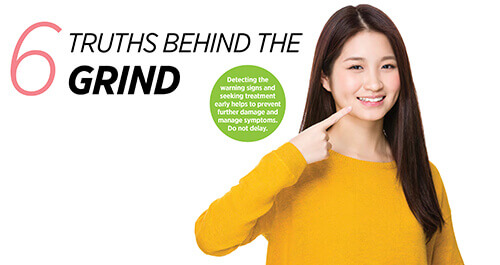
This article first appeared in the May 2017 issue of Epoch Times. We have reproduced it for the information of those of you who missed it when it was published.
Have you ever woke up with your jaw feeling tight or painful? Or find that you have frequent headaches or earaches? There may be a possibility that you are grinding your teeth or clenching your jaw (also known as bruxism). Dr Ho Kok Sen, Dental Specialist in Oral & Maxillofacial Surgery, at Specialist Dental Group shares six truths you need to know with regards to bruxism.
1) It can take place any time.
Bruxism can take place during the day and in the night, hence the terms awake bruxism and sleep bruxism respectively. When it happens in the day, it is easier for you to be made aware of it, which means the habit can be stopped or reduced by modification of behaviour. On the contrary, sleep bruxism occurs when you are asleep and unaware, making it harder to control. We have seen patients who realized that they were grinding their teeth at night only because their spouse told them so. The grinding sound was loud enough to wake their sleeping spouse. In such cases, modification of behaviour would not be possible and other treatment would be required (see point 6).
2) It is not normal.
Bruxism is considered a para-functional habit, which means that this is not a common way for the jaw to be used. The jaw is meant for functions like chewing, speaking but not grinding and clenching. When we sleep, our muscles supposedly enters a relaxed state. However, if teeth grinding takes place, the muscles are not getting sufficient rest, it becomes overworked and that causes tightness/pain to the jaw, temple or ear. The tension is similar to the muscle pain felt after running continuously without rest for extended periods of time.
3) It affects more than your teeth.
Bruxism wears down your teeth in the long run due to the tooth enamel grinding against other tooth enamel. It results in the dentine layer of the teeth being exposed, causing hypersensitivity. If the teeth already has fillings or root canal treatment done, some of these teeth may even crack. Some patients also encounter swollen gums. These are permanent damage on the teeth and gums and may ultimately result in tooth loss.
However, apart from your teeth and gums, your masseter muscles (the one you use for chewing) may be affected too. Clenching and grinding puts your masseter muscles under tension consistently, over develops it and resulting in the jaw being bigger or bulging out (hypertrophy). Another symptom is called trismus, a condition where the jaw cannot open fully. In more serious cases, patients can only open their jaw as wide as the width of a finger.
4) It may be due to stress.
The exact causes for bruxism is not always clear, but for majority of the cases, it has been attributed to high level of stress and anxiety. High levels of stress at work or home can negatively impact your sleep quality and cause sleep bruxism. Other reasons for bruxism include sleep disorders (such as obstructive sleep apnea), medications, lifestyle factors (such as consumption of excessive amounts of alcohol, smoking or caffeinated drinks) and poor bite or misaligned teeth.
5) It can happen to children too.
The prevalence of bruxism decreases with age – which means bruxism is the most common among children below five and least common among adults over 65 years of age. For children, the cause of bruxism is largely similar to adults – stress, anxiety, teeth alignment and teething. As most of them outgrow it when they are 13, treatment is generally not required unless the habit is causing troubling symptoms such as excessive dental wear (if that happens, see the next point). If not, Dr Ho recommends parents to relook into their child’s timetable, possibly inject more fun during the day and help them to relax.
6) It can be treated.
If you find that you are suffering from any of the above mentioned symptoms, it is advised that you visit a dentist. Depending on the cause of bruxism, Dr Ho generally starts with conservative treatments such as diet adjustments (go on a soft diet and cut food into smaller sizes so as to reduce the amount of chewing) and medication (e.g. muscle-relaxants, anti-inflammatory drugs). Patients would generally feel better after two weeks.
If required, a night guard (also known as splint) can be custom made according to patient’s dentition to prevent further damage to teeth and gums. Detecting the warning signs and seeking treatment early helps to prevent further damage and manage symptoms. Do not delay.





